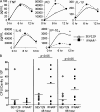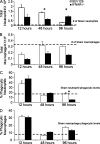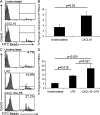Type I interferon signaling in hematopoietic cells is required for survival in mouse polymicrobial sepsis by regulating CXCL10
- PMID: 20071504
- PMCID: PMC2822595
- DOI: 10.1084/jem.20091959
Type I interferon signaling in hematopoietic cells is required for survival in mouse polymicrobial sepsis by regulating CXCL10
Abstract
Type I interferon (IFN) alpha/beta is critical for host defense. During endotoxicosis or highly lethal bacterial infections where systemic inflammation predominates, mice deficient in IFN-alpha/beta receptor (IFNAR) display decreased systemic inflammation and improved outcome. However, human sepsis mortality often occurs during a prolonged period of immunosuppression and not from exaggerated inflammation. We used a low lethality cecal ligation and puncture (CLP) model of sepsis to determine the role of type I IFNs in host defense during sepsis. Despite increased endotoxin resistance, IFNAR(-/-) and chimeric mice lacking IFNAR in hematopoietic cells display increased mortality to CLP. This was not associated with an altered early systemic inflammatory response, except for decreased CXCL10 production. IFNAR(-/-) mice display persistently elevated peritoneal bacterial counts compared with wild-type mice, reduced peritoneal neutrophil recruitment, and recruitment of neutrophils with poor phagocytic function despite normal to enhanced adaptive immune function during sepsis. Importantly, CXCL10 treatment of IFNAR(-/-) mice improves survival and decreases peritoneal bacterial loads, and CXCL10 increases mouse and human neutrophil phagocytosis. Using a low lethality sepsis model, we identify a critical role of type I IFN-dependent CXCL10 in host defense during polymicrobial sepsis by increasing neutrophil recruitment and function.
Figures






References
-
- Delano M.J., Scumpia P.O., Weinstein J.S., Coco D., Nagaraj S., Kelly-Scumpia K.M., O’Malley K.A., Wynn J.L., Antonenko S., Al-Quran S.Z., et al. 2007. MyD88-dependent expansion of an immature GR-1+CD11b+ population induces T cell suppression and Th2 polarization in sepsis. J. Exp. Med. 204:1463–1474 10.1084/jem.20062602 - DOI - PMC - PubMed
Publication types
MeSH terms
Substances
Grants and funding
LinkOut - more resources
Full Text Sources
Other Literature Sources
Medical
Molecular Biology Databases
Miscellaneous

